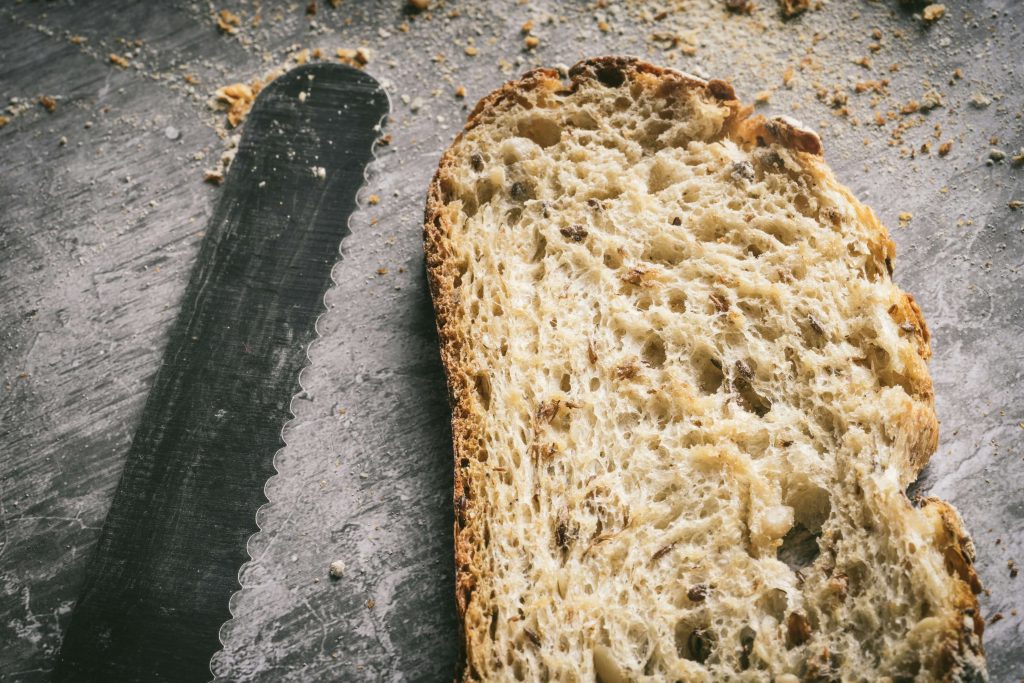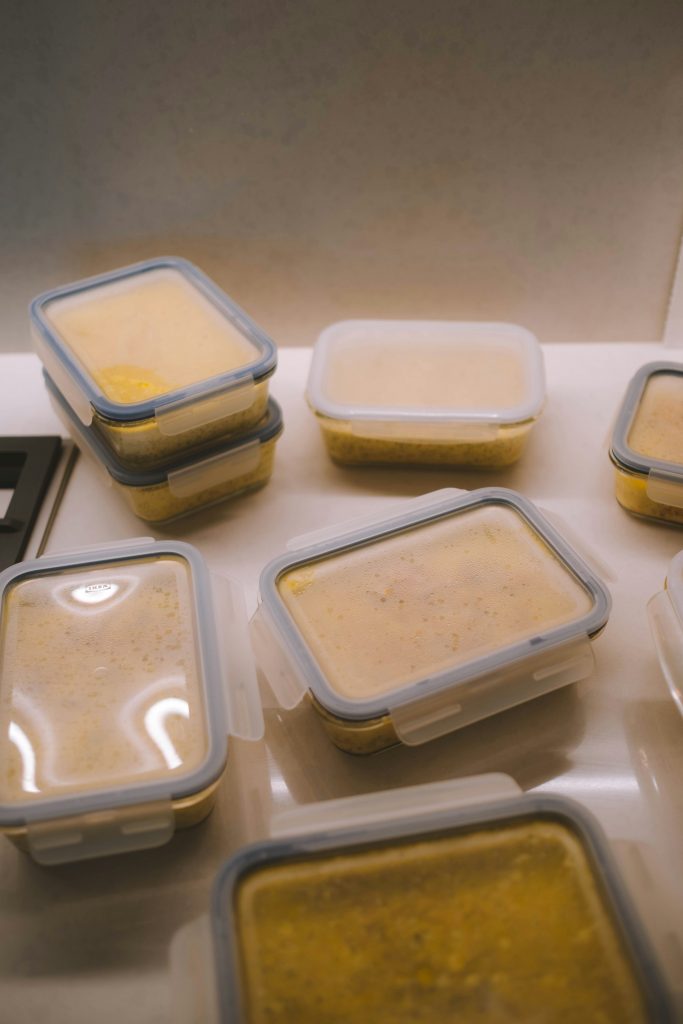Get organised
One of the first things you can do to get prepared for using up all your food is to organise your kitchen in a way that makes it easier. Once you’ve set up this system, you’ll find it much easier to see what you have, what you need, and what is nearly past it’s sell-by date. Overstuffed cupboards or fridges with older foods languishing at the back are a recipe for forgetting about food, leading to it going out of date before you get a chance to use it.
- Rotate goods: put the new stuff at the back and move the older stuff to the front to avoid older products lurking at the back.
- Create an ‘eat me first’ box or shelf in your fridge: so everyone knows that this needs eating first.
- Go through your food, twice a week if you can, making a note of food items that will go off soon. Combine it with other weekly chores so you don’t forget.
Check your fridge temperature
Keeping your fridge at the correct temperature will help keep your food fresh.
WRAP says the average UK fridge temperature is set way too hot at 7 degrees celsius. Setting it at 5 degrees instead could extend the life of milk and other perishable items.
Bread
If you haven’t got through a loaf of bread, fear not! There are lots of uses for it, and even some ways to bring it back to life too.
If your sliced bread has gone a bit stale, and is past the point of toasting and hoping for the best, stick it into a blender and turn it into breadcrumbs. These can be kept in the freezer and used straight from frozen. You can use your breadcrumbs to thicken a soup, stuffing or even add them to something like meatballs to make the meat go further.

Dovile Ramoskaite via unsplash
If you don’t have a blender or aren’t big into the breadcrumb scene, you could dice the bread, freeze it, and then bake it with olive oil and salt to turn into croutons at a later date.
If you have a whole loaf of bread which is stale, there is a trick to reviving it. Run the loaf under cold water and then place in a very hot oven for about 5-10 minutes (keeping an eye on it). This will soften it back up again!
Vegetables
Instead of dumping all of your onion and garlic skins, vegetable peelings and carrot tops into the bin, put them in a Tupperware or sandwich bag in the freezer, and once full you can turn it into vegetable stock. Simply boil all the veg in some water on a low heat for 4 hours, and add salt and pepper, a bit of garlic and a bay leaf or two. Drain and voila – stock!
Remember though that often you can eat more of a vegetable than you think. Cauliflower leaves are a great addition to a salad or slaw and can be roasted or fried. Broccoli stalk can be cooked just like broccoli, it just needs the harder outside layer chopping off. Add them to soups or a roasting tin as you would add your other vegetables.
If you’ve got some sad looking veg that hasn’t quite made it into any of your dinners, you can always turn it into a soup. Healthy, hearty, and it doesn’t matter if your carrot is bendy once it’s blitzed.
If your leafy greens, like spinach or lettuce, are wilting, one thing you can try is to shock them back to life. Give your greens an ice bath, and they will spring back to looking good as new.
Herbs and spices
If you’ve got too many herbs and not enough time, simply add them into an ice cubes tray, top up with oil and freeze. Then when you’re cooking something just pop the oily herby cube straight into the pan.
When it comes to things like ginger and chilli, you might not get through them very quickly but they’re always handy to have on hand. Freeze them, and then simply grate them into whatever you’re cooking. Same flavour, less waste.
Freezer
Label it
You can freeze so many more things than you think. But one very important top tip is to label and date anything that goes into your freezer. That way you’ll know what it is, when it went in and not find yourself defrosting something without any clue what it is.
Potatoes
Did you know that if you parboil potatoes, let them cool, and then freeze them, they are basically ready to cook in some oil for roast potatoes? The freezing process even dries them out a bit to make them even crispier.
Portion it out
Divide up bigger dishes into different containers so you can easily dig out a couple of portions at a time instead of the whole lot.
Frozen wine and cake
Another thing you might not think to freeze is leftover wine – we know, it does happen! Fill up an ice cube tray with your leftover wine, and then you can pop them straight into whatever you’re cooking at a later date to give it a richer, deeper flavour.
If you’ve got a bit of cake left and don’t want to eat it, you can freeze this too. Plus, then you’ve got cake on hand for a day when you really need cake!
When it comes to cake too, don’t throw away your butter wrappers – keep hold of them for greasing your cake tins and make the most of every bit of butter.
Have a plan
The key to not wasting food is to plan – plan meals and plan what to do with your leftovers.

Kate Trifo via unsplash
Making a meal plan will help you stick to your shopping list – saving you money as well as helping you generate less waste. It will also remove some of the stress of having to think about what to cook every. Single. Day.
One handy tool for when you have a selection of random ingredients left that need using up is the supercook recipe generator. Just add what ingredients you’ve got, and it will pull up recipes for you.
Share food with friends … and neighbours!
If you are going on holiday or have still got ingredients left you know you will not use, take a photo and post it to an app such as Olio, which helps neighbours pool their food resources.
It’s also a good way of seeing what food is being shared in your area, so you can use it in reverse, saving those pennies again.
Compost
If all fails, and you have food that you cannot eat, give away or share (such as apple cores, stones etc.) an essential element of reducing food waste is to compost. If you have a garden, you can use a compost bin or your council may collect food waste, depending on where you live.
Composting can save almost 150 kilograms of CO2 over the course of a year from going to landfill sites.
Composting old or unused food means it can be re-used as soil fertiliser or even be converted to biogas that can used as electricity or fuel.
Lead image: Sven Brandsma via unsplash


